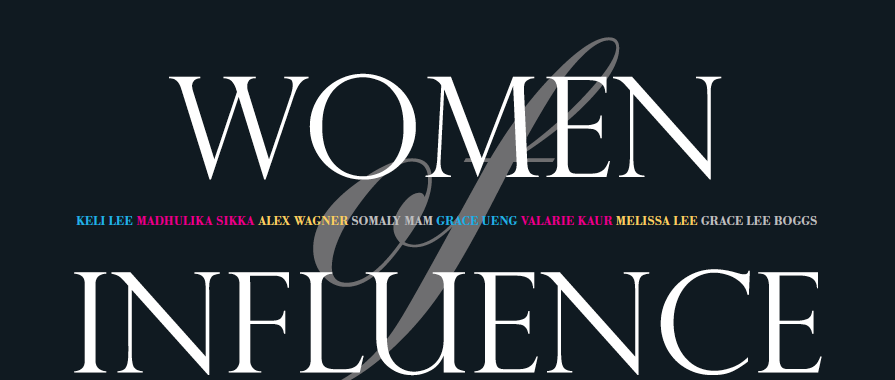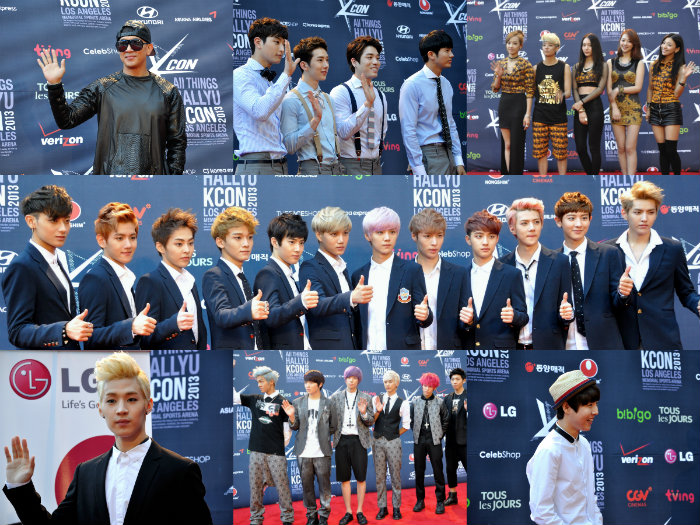Article: WOMEN OF INFLUENCE
ISSUE: FALL 2013
Influence comes in many forms, from high-profile advocates who are shaping ideas on an international stage to local heroes who are breaking barriers and defying expectations in their own communities. In our inaugural series celebrating influential Asian American women, Audrey Magazine highlights eight newsmakers, activists, leaders and trailblazers who encourage us to pursue our dreams, explore the unknown, and stand up for those without a voice.
CLICK HERE FOR MORE ASIAN AMERICAN INFLUENTIAL WOMEN!
by Ada Tseng
“ONE OF MY CEO CLIENTS SAID TO ME, ‘GRACE, YOU WILL THINGS TO HAPPEN.’ ALL ENTREPRENEURS WILL THINGS TO HAPPEN; YOU HAVE TO REALLY WANT IT. ESPECIALLY WHEN THERE ARE MOUNTAIN-MOVING GOALS, YOU HAVE TO INSPIRE PEOPLE TO MAKE IT HAPPEN.” – Grace Ueng
Grace Ueng was supposed to be an engineer. Her father was a professor at Georgia Tech, she grew up surrounded by engineering magazines, and after only applying to universities that had engineering programs, she ended up at MIT. But when she got there, she found herself scrambling to find her place in this environment of technical geniuses.
What she discovered was that she was a better leader than a programmer. Despite the fact that she had mapped out an escape route to study English at another Ivy League, she ended up being elected president of her MIT class and continued to serve for the next three years. After transferring to the school’s Sloan School of Management, where she studied management science and marketing, Ueng started the Sloan undergraduate Management Association, which still runs today. She would eventually go to Harvard Business School.
“I wasn’t the super geek who codes, but because I went to MIT, I really understood technical people,” says Ueng, who has worked for a number of technology start-ups and led campaigns for entrepreneurial technology companies that produced more than $1 billion of value for investors. “A lot of technical people don’t know how to bring their brilliance to the market, but in order for people to take advantage of their invention, it has to be packaged up. That’s where I come in.”
Nowadays, as CEO of Savvy Marketing Group, whose slogan is “Your successful venture is our passion,” Ueng has been called everything from “a success accelerator,” “a strategic weapon” to “a corporate therapist” by clients that now understand how strategic marketing can be integral to the success of their company.
When Ueng founded Savvy Marketing, many of her earlier clients were based in North Carolina’s Research Triangle Park, home to many of the nation’s prominent high-tech research and development centers. Ten years and approximately 100 projects later, she has branched out into health care (marketing medical technologies and devices), has started a nonprofit practice (recently, she helped revamp the business plan of a local organization that gives small business loans to rural and underprivileged populations), and has begun consulting companies interested in taking advantage of the Chinese market (an area she became interested in after teaching entrepreneurial marketing at Shanghai’s Fudan university).
Looking back, when she was working in executive teams where she was often the youngest member and the only Asian American woman, she says she was always trying to be superwoman. “Also, because I was a single mom, I felt like I had to prove that I could do what men, who had wives to do everything at home for them, could do,” says Ueng. “And now I realize women should just be themselves. I was always so focused, but you can’t always plan life.”
This was a lesson that was cemented eight years ago when she “literally went downhill at 40.” A few days before her 40th birthday, she was involved in a biking accident that left her with a broken neck and without her short-term memory. Neurospecialists told her she couldn’t work for months, but she was able to relearn everything and finish the projects she promised she would finish. Since then, she’s established a healthier work-life balance, and her second chance at life just makes her appreciate her work more.
“I want my clients to think big, and I want to help them get big,” says Ueng. “One of my CEO clients said to me, ‘Grace, you will things to happen.’ All entrepreneurs will things to happen; you have to really want it. Especially when there are mountain-moving goals, you have to inspire people to make it happen.”
WEB EXCLUSIVES
On being initially intimidated while studying at MIT
I sometimes think that if I went to a less intense school, maybe I would have been an engineer. But it was my freshman year, I was put with the smartest woman from Korea and the smartest person from the Philippines, and everyone was so intensely brilliant. Then there was me, from Georgia, where people say, “Hey y’all!” I realized being a science brainiac wasn’t my thing, and decided to do what I wanted to do in that environment. It was definitely very rigorous, but I was always surrounded by very collaborative people at MIT.
On her bike accident at 40
It was a life-changing experience. After my head injury, my first words were in Chinese, [which she had learned as a kid but didn’t speak as an adult]. It was such a wild experience, and when I started forgetting my Chinese, they told me it was good cause my brain was healing. I couldn’t work for a number of months because I had to rest, and that was hard. It made me really appreciate life because it was almost gone, and I was also asked to do more inspirational talks, which I loved.
On her initial goals when working with clients
First, I always want to understand what the client’s goals are and how our influence can help them be successful. When Ping Fu [of Geomagic, now 3D Systems Corporation] hired me, she told me, “I seek truth, not comfort.” And our role to always tell the truth to our clients. We see things in a different way. They’re so close to their business, and we can give them an outside perspective, and sometimes it’s tough, because I definitely see all the issues, but it’s my responsibility to point them out and help figure out solutions. It’s our responsibility to go in quickly, assess the situation, ask for the right data, gather the right data, and generate new data in order to glean insights and help implement change.
Who influences you?
Well, I’m most influenced by my parents and the way I was brought up, and then, on a day to day basis, by my 16-year-old son. And also my friends and clients, because I’m picky about the people I work with. I work with people with integrity and big goals. But I even learn from my interns because young people have a totally different point of view, and as much as they say I mentor them, it’s a two-way street. I think I learn from everybody, and you should learn from everybody.

BUY THE FALL 2013 ISSUE FEATURING OUR WOMEN OF INFLUENCE HERE.








